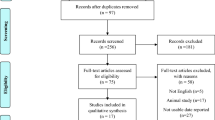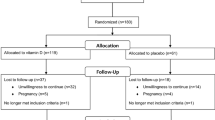Abstract
Aim
To investigate the therapeutical effect of vitamin D supplementation on the metabolism and endocrine parameters of PCOS patients.
Materials and methods
Clinical studies investigating the therapeutic effect of vitamin D supplementation on PCOS patients were selected by searching PubMed, Embase, The Cochrane library and Web of Science until April 2016. The included articles were selected according to the inclusion criteria. Serum HOMA-IR, QUICKI, LDL, DHEAS, free testosterone (FT), total testosterone (TT), PTH, 25-hydroxy-vitamin D, and triglyceride of PCOS patients were enrolled for evaluating the therapeutic effects of vitamin D.
Results
16 studies were included in this study. There was no significant difference between the placebo group and vitamin D group in the concentration of serum 25-hydroxy-vitamin D in patients with PCOS (P = 0.06). After treated with vitamin D, the serum 25-hydroxy-vitamin D in PCOS patients was increased (P < 0.00001), while the serum PTH (P = 0.003) and triglyceride (P = 0.006) were decreased. In addition, the serum HOMA-IR, QUICKI, LDL, DHEAS, FT, and TT in PCOS patients did not change. Subgroup analysis showed that the serum triglyceride of PCOS patients was decreased by low dose of vitamin D supplementation (<50,000 IU) (P = 0.03), but no significantly changed by high-dose vitamin D supplementation (≥50,000 IU) (P = 0.17).
Conclusion
Vitamin D supplementation significantly attenuates serum PTH and triglyceride in PCOS patients except for serum HOMA-IR, QUICKI, LDL, DHEAS, FT, and TT. Furthermore, less than 50,000 IU vitamin D supplementation is sufficient for decreasing serum triglyceride.




Similar content being viewed by others
References
Baskind NE, Balen AH (2016) Hypothalamic-pituitary, ovarian and adrenal contributions to polycystic ovary syndrome. Best Pract Res Clin Obstet Gynaecol 37:80–97
Holick MF, Binkley NC, Bischoff-Ferrari HA, Gordon CM, Hanley DA, Heaney RP, Murad MH, Weaver CM (2011) Evaluation, treatment, and prevention of vitamin D deficiency: an Endocrine Society clinical practice guideline. J Clin Endocrinol Metab 96:1911–1930
Patra SK, Nasrat H, Goswami B, Jain A (2012) Vitamin D as a predictor of insulin resistance in polycystic ovarian syndrome. Diabetes Metab Syndr 6:146–149
Muscogiuri G, Mitri J, Mathieu C, Badenhoop K, Tamer G, Orio F, Mezza T, Vieth R, Colao A, Pittas A (2014) Mechanisms in endocrinology: vitamin D as a potential contributor in endocrine health and disease. Eur J Endocrinol 171:R101–R110
Pal L, Berry A, Coraluzzi L, Kustan E, Danton C, Shaw J, Taylor H (2012) Therapeutic implications of vitamin D and calcium in overweight women with polycystic ovary syndrome. Gynecol Endocrinol 28:965–968
Sanders KM, Nicholson GC, Ebeling PR (2013) Is high dose vitamin D harmful? Calcif Tissue Int 92:191–206
Firouzabadi R, Aflatoonian A, Modarresi S, Sekhavat L, MohammadTaheri S (2012) Therapeutic effects of calcium & vitamin D supplementation in women with PCOS. Complement Ther Clin Pract 18:85–88
Wehr E, Pieber TR, Obermayer-Pietsch B (2011) Effect of vitamin D3 treatment on glucose metabolism and menstrual frequency in polycystic ovary syndrome women: a pilot study. J Endocrinol Invest 34:757–763
Garg G, Kachhawa G, Ramot R, Khadgawat R, Tandon N, Sreenivas V, Kriplani A, Gupta N (2015) Effect of vitamin D supplementation on insulin kinetics and cardiovascular risk factors in polycystic ovarian syndrome: a pilot study. Endocr Connect 4:108–116
Raja-Khan N, Shah J, Stetter CM, Lott ME, Kunselman AR, Dodson WC, Legro RS (2014) High-dose vitamin D supplementation and measures of insulin sensitivity in polycystic ovary syndrome: a randomized controlled pilot trial. Fertil Steril 101:1740–1746
He C, Lin Z, Robb SW, Ezeamama AE (2015) Serum vitamin D levels and polycystic ovary syndrome: a systematic review and meta-analysis. Nutrients 7:4555–4577
Thomson RL, Spedding S, Buckley JD (2012) Vitamin D in the aetiology and management of polycystic ovary syndrome. Clin Endocrinol (Oxf) 77:343–350
Wehr E, Pilz S, Schweighofer N, Giuliani A, Kopera D, Pieber TR, Obermayer-Pietsch B (2009) Association of hypovitaminosis D with metabolic disturbances in polycystic ovary syndrome. Eur J Endocrinol 161:575–582
Kyrkou G, Trakakis E, Attilakos A, Panagopoulos P, Chrelias C, Papadimitriou A, Vaggopoulos V, Alexiou E, Mastorakos G, Lykeridou A, Kassanos D, Papaevangelou V, Papantoniou N (2016) Metabolic syndrome in Greek women with polycystic ovary syndrome: prevalence, characteristics and associations with body mass index. A prospective controlled study. Arch Gynecol Obstet 293:915–923
Razavi M, Jamilian M, Karamali M, Bahmani F, Aghadavod E, Asemi Z (2016) The effects of vitamin D-K–calcium co-supplementation on endocrine, inflammation, and oxidative stress biomarkers in vitamin D-deficient women with polycystic ovary syndrome: a randomized, double-blind, placebo-controlled trial. Horm Metab Res 48:446–451
Tao MF, Zhang Z, Ke YH, He JW, Fu WZ, Zhang CQ, Zhang ZL (2013) Association of serum 25-hydroxyvitamin D with insulin resistance and beta-cell function in a healthy Chinese female population. Acta Pharmacol Sin 34:1070–1074
Jia XZ, Wang YM, Zhang N, Guo LN, Zhen XL, Li H, Wei L (2015) Effect of vitamin D on clinical and biochemical parameters in polycystic ovary syndrome women: a meta-analysis. J Obstet Gynaecol Res 41:1791–1802
Asemi Z, Foroozanfard F, Hashemi T, Bahmani F, Jamilian M, Esmaillzadeh A (2015) Calcium plus vitamin D supplementation affects glucose metabolism and lipid concentrations in overweight and obese vitamin D deficient women with polycystic ovary syndrome. Clin Nutr 34:586–592
Rotterdam ESHRE/ASRM-Sponsored PCOS consensus workshop group (2004) Revised 2003 consensus on diagnostic criteria and long-term health risks related to polycystic ovary syndrome (PCOS). Hum Reprod 19:41–47
Kotsa K, Yavropoulou MP, Anastasiou O, Yovos JG (2009) Role of vitamin D treatment in glucose metabolism in polycystic ovary syndrome. Fertil Steril 92:1053–1058
Ardabili HR, Gargari BP, Farzadi L (2012) Vitamin D supplementation has no effect on insulin resistance assessment in women with polycystic ovary syndrome and vitamin D deficiency. Nutr Res 32:195–201
Irani M, Seifer DB, Grazi RV, Julka N, Bhatt D, Kalgi B, Irani S, Tal O, Lambert-Messerlian G, Tal R (2015) Vitamin D supplementation decreases TGF-beta1 bioavailability in PCOS: a randomized placebo-controlled trial. J Clin Endocrinol Metab 100:4307–4314
Selimoglu H, Duran C, Kiyici S, Ersoy C, Guclu M, Ozkaya G, Tuncel E, Erturk E, Imamoglu S (2010) The effect of vitamin D replacement therapy on insulin resistance and androgen levels in women with polycystic ovary syndrome. J Endocrinol Invest 33:234–238
Acknowledgements
This study is financially supported by the National Natural Science Foundation of China (Grant No. 81401176).
Author information
Authors and Affiliations
Corresponding authors
Ethics declarations
Conflict of interest
The authors have declared no conflict of interest.
Ethical approval
This article does not contain any studies with human participants or animals performed by any of the authors.
Additional information
Y. Xue and P. Xu contributed equally.
Rights and permissions
About this article
Cite this article
Xue, Y., Xu, P., Xue, K. et al. Effect of vitamin D on biochemical parameters in polycystic ovary syndrome women: a meta-analysis. Arch Gynecol Obstet 295, 487–496 (2017). https://doi.org/10.1007/s00404-016-4247-y
Received:
Accepted:
Published:
Issue Date:
DOI: https://doi.org/10.1007/s00404-016-4247-y




